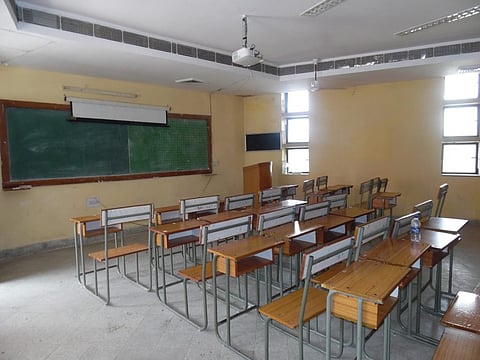
- Latest Legal News
- News
- Dealstreet
- Viewpoint
- Columns
- Interviews
- Law School
- Legal Jobs
- हिंदी
- ಕನ್ನಡ

Every landmark judgment in India carries an invisible signature not just of the judge, but of the law teacher who once shaped that judge’s mind. The teacher is not only a transmitter of knowledge but also a moral guide.
Every year on the 5th of September, Teacher's Day is celebrated in India as a tribute to the beacons who instill knowledge and values in us. However, among these mentors, there is a group whose work rarely makes headlines, even though their influence permeates every courtroom in the country: law teachers.
They teach much more than legal provisions, statutes and precedents. They inaudibly shape the intellectual frameworks of lawyers, judges, lawmakers and policymakers. From the first lecture on constitutional law to the last-minute coaching before a judicial services interview, law teachers leave an indelible imprint on the legal landscape of this country.
A Supreme Court judge once recalled that his most enduring lessons came not from the Bench but from the quiet guidance of his law professor. The remark captures a larger truth: the efficiency of law cannot be measured merely by statutes and decisions, but by the ideas, institutions and educators who sustain it.
Law teachers of India have played a pivotal role after independence in the shaping of the institutional framework of the Republic. The nexus between legal education, social justice and policy-making was redefined by visionary intellectuals such as Prof Upendra Baxi, Prof NR Madhava Menon and Prof Lotika Sarkar. Their scholarship ensured that classrooms became directly connected directly with reforms, such as gender justice and judicial accountability.
But these stalwarts are not the only ones. Besides faculty from elite national law universities (NLUs), a myriad of teachers of state university and law colleges have trained generation of legal aid lawyers, prosecutors and judges.
Their modest classrooms may lack proper resources, but they too often ignite the first spark that shapes a career in the legal field. The role of a law teacher has always extended far beyond teaching. They are mentors who mould aspiring lawyers, researchers who highlight legal gaps and advisors who guide the drafting of legislation. They mentor students, advise policymakers and influence those who enter the justice system.
One of the most underappreciated yet most important roles offered by law teachers is their ability to identify gaps in the legal framework. Through books and research, they often anticipate challenges from cybercrime to privacy long before lawmakers act. Their scholarship enters courtrooms, ministries and even forms the basis of public interest litigation.
History attests to their decisive role. Prof Shamnad Basheer's scholarship shaped debates in Novartis v Union of India (2013) on patents and access to medicines. PP Rao in SR Bommai v Union of India (1994) consolidated secularism. Menaka Guruswamy and Arundhati Katju led Navtej Johar (2018). To secure the future, India must honour and empower its law teachers.
This influence is not specific to India; throughout the world, law professors have influenced doctrine and democracy in deep and lasting ways. In the United States, the work of Charles Hamilton Houston set the stage for Brown v. Board of Education (1954), which brought an end to segregation in the schools. The writings of Yale Kamisar influenced Miranda v. Arizona (1966), creating the Miranda rights that govern police practice throughout the world.
Celebration, however, needs to be tempered by realism. Indian legal academia is burdened with persistent challenges: faculty shortage, poor funding, lack of world exposure. Talented teachers leave for the Bar, judiciary, or foreign universities, hence causing "brain drain". Curricula are antiquated and research in new streams like artificial intelligence law or climate justice is under-funded. Another issue lies in regional imbalance. While NLUs, Symbiosis, Christ thrive, many state law colleges, especially in the North East and smaller towns struggle without adequate faculty, library resources or research grants.
If law teachers are not supported, the inequality in access to quality legal education in India will deepen. For the Indian legal field to remain the vibrant and future-oriented space it is meant to be, India must make a concerted effort to invest in its law teachers: through higher remuneration, endowed positions, academic positions in reform commissions, court-university collaborations, international exchanges, digital research platforms and effective mentorship regimes.
On this Teachers' Day, when we celebrate the gurus who mould all the professions, we should give a special salutation to those silent architects of justice. Behind each principled judgment, there is an unperceived guide.
Dr Ajaz Afzal Lone is an Assistant Professor at the University Institute of Legal Studies, Chandigarh University.